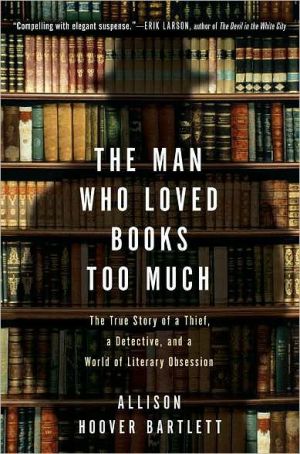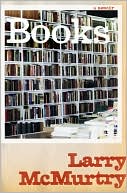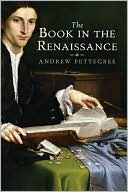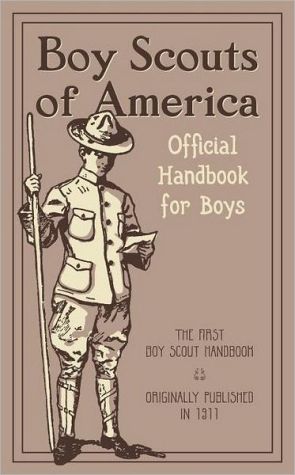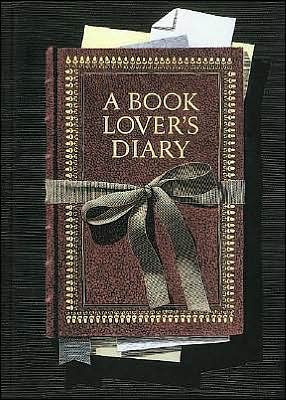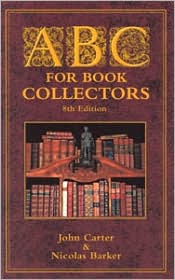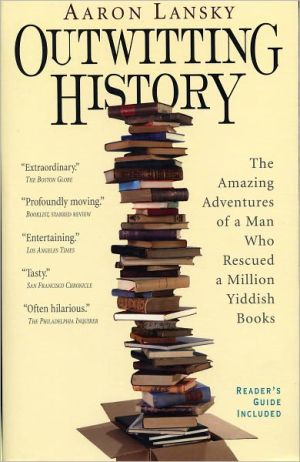The Man Who Loved Books Too Much: The True Story of a Thief, a Detective, and a World of Literary Obsession
In the tradition of The Orchid Thief, a compelling narrative set within the strange and genteel world of rare-book collecting: the true story of an infamous book thief, his victims, and the man determined to catch him.\ Rare-book theft is even more widespread than fine-art theft. Most thieves, of course, steal for profit. John Charles Gilkey steals purely for the love of books. In an attempt to understand him better, journalist Allison Hoover Bartlett plunged herself into the world of...
Search in google:
In the tradition of The Orchid Thief, a compelling narrative set within the strange and genteel world of rare-book collecting: the true story of an infamous book thief, his victims, and the man determined to catch him.Rare-book theft is even more widespread than fine-art theft. Most thieves, of course, steal for profit. John Charles Gilkey steals purely for the love of books. In an attempt to understand him better, journalist Allison Hoover Bartlett plunged herself into the world of book lust and discovered just how dangerous it can be.Gilkey is an obsessed, unrepentant book thief who has stolen hundreds of thousands of dollars' worth of rare books from book fairs, stores, and libraries around the country. Ken Sanders is the self-appointed "bibliodick" (book dealer with a penchant for detective work) driven to catch him. Bartlett befriended both outlandish characters and found herself caught in the middle of efforts to recover hidden treasure. With a mixture of suspense, insight, and humor, she has woven this entertaining cat-and-mouse chase into a narrative that not only reveals exactly how Gilkey pulled off his dirtiest crimes, where he stashed the loot, and how Sanders ultimately caught him but also explores the romance of books, the lure to collect them, and the temptation to steal them. Immersing the reader in a rich, wide world of literary obsession, Bartlett looks at the history of book passion, collection, and theft through the ages, to examine the craving that makes some people willing to stop at nothing to possess the books they love.Publishers WeeklyIn the late 1990s, John Gilkey stole his way through a significant number of expensive antiquarian book collections. Ken Sanders, a book collector and security chair for the Antiquarian Booksellers' Association, noticed the pattern of thefts and began pursuing Gilkey, whose obsession with his precious old books led him to commit a flurry of other crimes—stealing credit cards and forging checks. Bartlett opens up the quirky world of book collecting fanatics with respect but occasionally too much adulation—a perspective that Judith Brackley is guilty of in her more effusive moments. But on the whole, Brackley's enthusiasm is welcome; she excels when exploring the minutiae and arcana of the book collecting subculture and executes the male voices well, with a clear distinction and depth. A Riverhead hardcover (Reviews, July 27). (Jan.)
From Chapter 9, "Brick Row"\ A couple of months after Gilkey's 2005 release from prison, I met him in front of 49 Geary Street, a building that houses several art galleries and rare book stores, in San Francisco. It was a September morning and he wore a bright white sweatshirt, pleated khakis, his beige leather sneakers, and the PGA baseball cap. He held a folder, on top of which lay a handwritten, numbered list, his to-do list for the day.\ "So, how do you want to do this?" he asked.\ The week before, he had agreed to let me tag along with him on one of his scouting trips, to learn how he selects books. I had suggested going to Goodwill, a frequent haunt of his now that he was persona non grata in most San Francisco rare book shops. Gilkey, though, wanted to take me to Brick Row, from which he stole The Mayor of Casterbridge. I tried to mask my disbelief and hoped he would think of another place.\ "Are you sure?" I asked. "Wouldn't Goodwill work? Or, if not that, aren't there any other stores you can think of?"\ Probably sensing my unease, he hesitated. "Maybe they'll recognize me," he said, but reconsidered. "On second thought, it won't be a problem."\ At home, I e-mailed Sanders for his opinion: Would the owner, John Crichton, whom I had not yet met, be upset or angry that I'd knowingly accompanied a rare book thief into his store? I didn't relish dealing with the wrath of one of Gilkey's victims, however peripherally.\ "Crichton's a good guy," Sanders assured me and gave me the impression that, as Gilkey had said, it wouldn't be a problem.\ I was still wary, but too curious to walk away from an opportunity to see Gilkey in his element. What sort of person returns to the scene of his crime? So far, I had come to know Gilkey only through our private conversations. I still had no idea how he behaved out in the world, especially his idealized rare book world. He shared many characteristics of other collectors, but his thieving set him apart in ways that still confounded me—was he amoral or mentally ill? How are such lines drawn, anyway? Accompanying Gilkey to Brick Row was an irresistible chance to be an eyewitness. Also, I had heard that the shop was well regarded among rare book collectors, and I wanted to see it firsthand.\ Standing on the sidewalk in front of Brick Row, Gilkey said he would show me what he typically looks for and how he goes about it.\ He did not appear to be apprehensive. I, on the other hand, was all nerves. I had no idea what Crichton might do when we walked in. This, at the very least, was going to be awkward...\ Inside Brick Row, natural light streamed through the windows, illuminating books sitting in cases along every wall and under windows, and on a graceful arc of shelves that ran through the middle of the shop. It was a quiet refuge from the city streets below, and if you ignored the computer and phone on Crichton's heavy, oak desk, it could be a nineteenth-century bookshop. Thousands of majestic leather-bound books, many with gold lettering, caught the light as I walked by. Given Gilkey's Victorian library fantasies, I could see why he favored this shop, why he chose to bring me there. Unlike Sanders's shop in Salt Lake City, Brick Row was tidy and appeared highly ordered. I got the sense that only serious collectors would venture inside, in contrast to Sanders's shop, where collectors mingled with people in search of a good used paperback (he offered a selection at the back of the store). The doors of the locked bookcases on the right-hand wall near the entrance had metal screens in a crosshatch pattern that made deciphering titles a challenge. These cases contained some of Crichton's more valuable books. A filmmaker would do well to use Brick Row as a set for a gentleman's fine library. "More classier feel than some of the other bookstores that just rack them up in average bookcases," is how Gilkey had described it.\ Crichton spoke from behind his desk. "May I help you?"\ His question seemed to ask much more. He was looking hard at Gilkey.\ "I'm not here to buy anything," said Gilkey congenially, "just to look around, if that's okay. We're just here to look."\ No answer.\ Crichton stood facing us. He was in his fifties with white hair, a ruddy complexion, and clear blue eyes. He had an assured air and seemed to be the kind of person who rarely had the wool pulled over his eyes.\ Gilkey referred to his list of the Modern Library's "100 Best Novels," and explained to me how he often looks for books on it. He pointed to the name Nathaniel Hawthorne.\ "Do you have any Hawthorne?" Gilkey asked Crichton.\ Crichton answered curtly, "No."\ "I know he has one," Gilkey whispered to me.\ His comment was a hint at his antagonism toward dealers, which he had made plain in our prior meetings. He'd argued that there was, in fact, widespread fraud among rare book sellers, fraud that made him not only blameless, but also a victim.\ One example Gilkey had cited was rebinding. Dealers, he explained, would remove the cover and title page from a second or later edition of a book, and then rebind it with a title page from a first edition that was in poor condition.\ "They make it look like a first edition, first printing," he said. "That's part of the fraud they do. That's actually legal."\ Later, I learned that there was nothing legal about this practice, but that it was not uncommon. The more expensive the book, the more likely it is that someone may have tampered with the binding. Such fraud is hardly new. In the eighteenth century, for example, facsimiles of pages, or "leaves," of ancient texts were sometimes created by hand and to near perfect effect. Of course, these efforts did not always go undetected, particularly when the pages were printed on eighteenth-century paper with an identifiable watermark. Even now, dealers come across pages of books that have been washed to give them a uniform appearance. Reputable dealers judiciously examine books for telltale signs of rebinding, but there are less upstanding dealers who don't.\ As we inched down Brick Row's bookshelves, Gilkey pointed to another book on his list, "Kurt Vonnegut," he said. "I'd like something from him, too. And D. H. Lawrence," he said. "He's also good."\ Crichton looked stunned and turned his back to us, then turned around again to face Gilkey. A few seconds later, while Gilkey was explaining to me which books he might like to look for, Crichton asked, "What's your name?"\ "John."\ John—as though Crichton would be satisfied with a first name! I looked down at my notes while my heartbeat threatened to drown out everything around me.\ "John what?"\ "Gilkey."\ Crichton waited a moment, glanced down at his desk, then looked up. He didn't take his eyes off us as Gilkey pointed to various books and whispered, as one does in a library or museum, informing me about additional authors he was interested in: Vladimir Nabokov, Willa Cather. He commented that he stays away from bibles.\ "And who are you?" Crichton asked me.
\ From Barnes & NobleBarnes & Noble Discover Great New Writers\ For book lovers everywhere, there's nothing more pleasing than to hold a treasured book, to inhale its scent, to caress its pages. A home library reveals much about one's life, and avid readers can talk for hours about the titles, authors, and characters that changed their view of the world. Books are much more than objects that deliver content. Collected, savored, and loved, they shape identity, and readers have a rich and complex relationship with their books.\ \ Rare books hold even more power, providing a physical link to the past. Those who acquire a centuries-old manuscript or a signed first edition know their place in the chain of possession of a valuable artifact. For John Charles Gilkey, a man enthralled with books and aware of how they might express his ideal self, this relationship turned dark as he stole hundreds of thousands of books from rare-book dealers across the country. Bartlett's debut tells Gilkey's story, and the story of Ken Sanders, a book dealer with a penchant for detective work, who caught him.\ \ At once a book about passion, collection, and theft through the ages, as well as an intimate portrait of one of the most successful book thieves in history, The Man Who Loved Books Too Much takes readers inside a world of literary obsession.\ (Holiday 2009 Selection)\ \ \ \ \ Publishers WeeklyIn the late 1990s, John Gilkey stole his way through a significant number of expensive antiquarian book collections. Ken Sanders, a book collector and security chair for the Antiquarian Booksellers' Association, noticed the pattern of thefts and began pursuing Gilkey, whose obsession with his precious old books led him to commit a flurry of other crimes—stealing credit cards and forging checks. Bartlett opens up the quirky world of book collecting fanatics with respect but occasionally too much adulation—a perspective that Judith Brackley is guilty of in her more effusive moments. But on the whole, Brackley's enthusiasm is welcome; she excels when exploring the minutiae and arcana of the book collecting subculture and executes the male voices well, with a clear distinction and depth. A Riverhead hardcover (Reviews, July 27). (Jan.)\ \ \ Library JournalRare bookstore owner Ken Saunders relishes catching book thieves, and his favorite target is John Gilkey, a repeat offender who has spent multiple stints in jail for using stolen credit card numbers and bad checks to purchase books estimated to be worth together more than $100,000. In this intriguing account, journalist Bartlett takes readers behind the scenes at antiquarian book fairs and rare bookstores, where sellers are always on the lookout for thieves. Bartlett first meets Gilkey when he is serving time near San Francisco. Over several meetings, Gilkey explains that he feels he builds his image through books, proving himself a man of taste, knowledge, and affluence. VERDICT This excellent tale of people's intimate, complex, and sometimes dangerous relationships to books will be relished by readers, writers, and collectors who are passionate about books as well as fans of true crime stories. [See Prepub Alert, LJ 5/1/09.]—Joyce Sparrow, JWB Children's Svcs. Council, Clearwater, FL\ \ \ \ \ Kirkus ReviewsA Janet Malcolm-style reflection on the ramifications of a reporter's interaction with a criminal, in this case one with a bibliomania shared by the antiquarian book dealer pursuing him. Over four years, John Charles Gilkey pilfered hundreds of thousands of dollars worth of rare books, often with credit-card numbers obtained from his part-time job at Saks Fifth Avenue. As freelance journalist Bartlett points out, antiquarian-book theft occurs more frequently than that of fine art. Rather than advertise a theft that would inflame fears of lax security, dealers often prefer to stay quiet about losses. Gilkey's passion-but not his larcenous instinct-was shared by Ken Sanders, a rare-book dealer and volunteer security chair of the Antiquarian Booksellers' Association of America, who doggedly tracked the con man, sometimes at the expense of his own business. Sanders is part of a profession often composed of obsessives who do the work as a labor of love, barely making ends meet. Though she misses a few aspects of the business-e.g., does the Internet secure or tighten dealers' control over their collections?-Bartlett is adept at explaining the mindset required for this trade. But as she interviews Gilkey and accompanies him on a few of his rounds, she finds herself asking questions about her project. Is she giving this narcissist attention that his crimes don't merit? Is she responsible for reporting his crimes to police and unsuspecting book dealers? Many readers will disagree that Gilkey had "come to seem a happy man with goals, ambition, and some measure of success," while supporting the opposite conclusion, that he was "greedy, selfish, criminal."Not only a "cautionary tale for those whoplan to deal in rare books in the future," but a demonstration of how a seasoned reporter can disregard the ethics of objectivity.\ \ \ \ \ Publishers WeeklyIn the late 1990s, John Gilkey stole his way through a significant number of expensive antiquarian book collections. Ken Sanders, a book collector and security chair for the Antiquarian Booksellers' Association, noticed the pattern of thefts and began pursuing Gilkey, whose obsession with his precious old books led him to commit a flurry of other crimes—stealing credit cards and forging checks. Bartlett opens up the quirky world of book collecting fanatics with respect but occasionally too much adulation—a perspective that Judith Brackley is guilty of in her more effusive moments. But on the whole, Brackley's enthusiasm is welcome; she excels when exploring the minutiae and arcana of the book collecting subculture and executes the male voices well, with a clear distinction and depth. A Riverhead hardcover (Reviews, July 27). (Jan.)\ \ \ \ \ From the Publisher"[Brackley's] soft voice, often near a toned whisper, adds the right atmosphere to a biography of a creepy man and a reporter's long search for his motive." —-AudioFile\ \ \ \ \ Library JournalIn her first book, freelance writer Bartlett lifts the veil on the methods of John Charles Gilkey, a thief whose prey of choice was rare books (between 1999 and 2003 he stole approximately $100,000 worth of books from dealers nationwide). Equally fascinating is Gilkey's pursuer, Ken Sanders, a rare-books dealer-turned-amateur detective. Listeners are drawn into the convoluted mind of the thief, the determination of the dealer, and the author's own ambivalence as she becomes involved with both figures and begins to question her journalistic impartiality. Narrator Judith Brackley, who has a long career as a voice artist, brings the appropriate degree of calm and matter-of-fact narration to this engaging material. For all book lovers, book collectors, and readers of true crime. [The Riverhead hc was an LJ Best Book of 2009.—Ed.]—J. Sara Paulk, Fitzgerald-Ben Hill Cty. Lib., GA\ \
